My View on Zazou
By Erna Adelson
Most of you already know Zazou Hoffman as the young rider who competes bi-coastally, both near her hometown in Santa Monica, CA and on the east coast circuit with Missy Clark. Her bio also reveals that among other notable accomplishments, Hoffman was one of seven elite riders chosen to work with Olympic Chef d’Equipe George Morris in Wellington, FL and has competed in the Medal Finals for the past three years. Additionally, she took first at Maclay Regional, 5th in “the Medal” at Harrisburg, 5th in the USET Talent Search East at Gladstone, 3rd in the WCE, and recently 3rd in the Maclay Finals.
Throughout her eventful career, Hoffman has also managed to find a way to make the sport accessible to all enthusiasts by regularly writing about her experiences. Her columns, found in CA Riding Magazine and in this newsletter, offer counsel and insight that resonates with all riders and provides a window to the inside of the most coveted places in the industry. As a writer, a rider, and a bi-coastal traveler myself, I was thrilled at the opportunity to interview Zazou Hoffman. Since our schedules and locations would never allow us to do this in person, of course, I did the next best thing to meeting her: I “friended” her on Facebook. This way, I gained insight into Zazou not just as a rider but as one of the most driven and busiest teenagers that I have ever (almost) met. Read on for Zazou’s revelations about keeping up with schoolwork, her remote social life, and even Tyra Banks.
ERNA: When did you know that much of your future budget and time would be dedicated mostly to competitive horseback riding? Did you ever question whether or not it was worth such an investment?
ZAZOU: Riding has been a part of my life since I was really little. I mean, I have pictures of me when I was three years old next to my mom’s horses and there has never been a doubt in my mind that horses would be a part of my life. Of course, when I was little, I had NO idea how much time and money had to be invested in the sport to get to the top. I can honestly say that I have never doubted that I wanted to put in all the time I possibly could to work at getting better, but money is something that is not really in my control. My family has been wonderful at helping me get to where I am, but there are times when it is very upsetting to see both my parents, and my brother making sacrifices that wouldn’t need to be made if I didn’t ride. We have all decided though that I am lucky enough to have found what I am passionate about at a young age, and we will all work hard to make it happen.
ERNA: Besides the time change, how did you have to adjust to riding and training primarily on the east coast? Are there any major differences between east and west coast venues?
ZAZOU: Well, the time change can actually be a pretty big part of it! But, in terms of the actual horseback riding, it’s about getting in the ring and getting the job done no matter where you are. I have had the incredible opportunity to be working with Missy Clark and John Brennan back east, and I learn something new every single day, but a lot of what I am learning is simply an extension of what I have learned from Meredith Bullock, who trains me in California. Some of the horses I am riding on the east coast are definitely nicer than some of the ones I have ridden at home, but nothing is “push-button” and it’s all just about riding. In terms of the venues, I have found that everything back east is just bigger; there are more horses, more people, and more horse shows.
ERNA: Could you elaborate on how you ended up riding with Missy Clark?
ZAZOU: I received the Ronnie Mutch Working Student Scholarship in 2005, which allowed me to travel to WEF to ride with Missy Clark for two weeks. Missy and I developed a great relationship and she invited me to continue riding with her as a working student. It all kind of took off from there!
ERNA: Could you also tell us a bit about your decision to continue riding with Missy as far away as Vermont rather than a similar caliber west coast trainer?
ZAZOU: There were a lot of things that factored into this decision. Basically though, Missy’s barn is fabulous. Missy and John and I immediately got along, the staff there works harder than any I’ve seen, the horses are amazing, and I simply saw an opportunity that I didn’t think I could turn down. I was really just coming off the ponies, and the offer of a working student position at North Run seemed irresistible. I had had lots of riding opportunities in California, but nothing that could compare to this. I think that if you want to be really competitive you need nation-wide exposure and you need to be learning from the best people you can put yourself in contact with. Learning from as many of the good people as possible helps a rider to understand what works for them and what doesn’t, as well as what they would like to take with them into their professional career.
ERNA: Do you now consider yourself an east coast rider or representing both the west and the east coasts?
ZAZOU: I consider myself as a rider that represents both coasts. I still have a fantastic trainer in California (Meredith Bullock), and while I may not go to as many horse shows with her, this is only because I do not regularly show a horse that I own. And then I have great trainers on the east coast with North Run. I consider my self bicoastal because I try to compete and continue learning in any state and at any horse show where I find myself.
ERNA: Besides riding, you also write a couple of regular columns. How did that part of your career materialize? Since writing seems to be another passion of yours, do you have any aspirations as a writer?
ZAZOU: My writing kind of evolved on its own. I really just started by doing a couple of small things for California Riding and branched off from there. This sport has given me a lot in my life and I figure all I can do is keep trying to give back in some ways. I think interviewing the great people in the sport is educational for me, and having it published gets it out there so others can learn as well. I have also gotten to the point in my riding where I have had the opportunity to experience a lot of new and different things that I think are important to share with others. I haven’t really thought much about my future in writing, but like I said I would really like to continue giving back to this sport in as many ways as I can.
ERNA: The question everyone probably asks you right now: Have you thought at all about which college/university you might attend? Besides a stellar riding program and possible scholarship money, what other factors are going into such a pivotal decision?
ZAZOU: Luckily, I am only a junior in high school, so I haven’t had to do my college apps yet, but I’m dreading the day. I’ve thought about college a little though, and my main priority is getting the best education I can. I would like to keep riding in college, but I’m not set on riding for a college team unless I think it’s going to help me get into a school I want to go to. From the little bit of research I’ve done, the school I would love to go to (but I think is a long shot to get into) would be Brown. Both my parents went to Berkeley, so that is also a school I have thought about. The whole admission process seems to be so complicated and so random that I think it is important to keep an open mind about what school I want to go to.
ERNA: High School is a notoriously tough time for teenagers. How do you deal with the frustrations of highly competitive riding–less than perfect outings, travel, and the added workload in addition to the pressures of teenagerhood (if there are any)?
ZAZOU: Oh boy, it can all get really stressful. I actually just started taking all of my classes online this year, and that has really helped. I am taking four Advanced Placement classes and one honors class through four different online programs. My parents and I agreed that the only way I would do online classes is if we felt that my education would in no way be compromised, so after a lot of research I found that UC Davis, UC Irvine, Stanford, and APEX had programs that I could rely on. Having the opportunity to take my classes online has been extremely helpful in making things less stressful. This has allowed me to stay back east all fall, which removed the added stress of traveling back and forth from CA to the east coast for each horse show. My friends at home are great though, and they are always there to be supportive. There is a great dynamic among the kids at North Run (Missy Clark’s barn) and, of course, my friends in California are always happy to see me when I am home. It is very comforting to have people around you who can help if you need anything.
ERNA: What is currently on your iTunes Playlist?
ZAZOU: I listen to anything and everything! I actually like just about every type of music so my iTunes playlist is all over the place. I always have it on shuffle to keep things interesting. That way I can get my fix of rock, hip hop, country, rap, and a little bit of everything else there is. I’ve got some of the Beatles, some Red Hot Chili Peppers, a little JT, some Taylor Swift…. the list goes on. I actually just saw the movie Slumdog Millionaire (which was fantastic and I recommend it to everybody) so I am currently a bit obsessed with the soundtrack, which was also amazing.
ERNA: I have gotten to know you a little better through some thorough facebook stalking. (Forgive me) It seems that you have somehow managed to balance your career and maintain a social life. Is there anything you ever feel like you are missing out on due to the demands of your competition and training schedule? (Prom, travel, etc)
ZAZOU: There are always social sacrifices that I have to make for my riding, and while I may have been a little bummed at the time, I have never felt that I have regretted any of them. Facebook has actually been a great way to stay in touch with my west coast friends when I’m back east and my east coast friends when I am home. It has definitely helped me keep a healthy social life, and like I said before I have a group of good friends who are really fun to hang out with. In terms of missing out on things, I’m hoping I will be home for Prom (at least my senior year). I have to say, some of my friends are going to Vienna, Budapest, and Munich for a choir trip, and I’d being lying if I said I wasn’t a little bit jealous, but then again, I probably get to travel more than any of them.
ERNA: I did also see that you listed America’s Next Top Model (ANTM) as one of your favorite shows. Hate to admit it, but I’m also sort of addicted…OK. Tyra Banks: Insane or a genius?
ZAZOU: Oh, ANTM has definitely consumed a large amount of my life for the past couple years! In my opinion, Tyra Banks is completely out of her mind, but the catch is, that her craziness is what makes her such a genius! It’s a great show–very addictive.
Thank you so much for doing this interview with me, Erna. Your questions were great, and I had a lot of fun answering them. I’m sure we will keep in touch through Facebook!
ERNA: Undoubtedly when I hear about Zazou Hoffman’s next triumph in the show ring, I won’t be the only person to offer my congratulations in the form of a facebook memo. But if I’m not mistaken, Zazou is a girl that collects wall posts like ribbons and cherishes them just as much.
About Erna L. Adelson
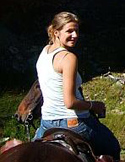 A bi-coastal writer and rider, Erna’s exposure to horses started at age 7, spending her summers at Road’s End Farm in Chesterfield, New Hampshire. In her junior year in high school, Erna achieved her first byline in the Montclair Times, the large local weekly paper of Montclair, NJ, and worked as a staff writer throughout her senior year in high school. Erna studied writing and sociology at UCSB and continued to ride as a working student With Rebecca Atwater at Santa Barbara Stables and at Creek Hollow Ranch in San Diego. She joined the staff at SB Fitness Magazine and also became a regular contributor to California Riding Magazine.
A bi-coastal writer and rider, Erna’s exposure to horses started at age 7, spending her summers at Road’s End Farm in Chesterfield, New Hampshire. In her junior year in high school, Erna achieved her first byline in the Montclair Times, the large local weekly paper of Montclair, NJ, and worked as a staff writer throughout her senior year in high school. Erna studied writing and sociology at UCSB and continued to ride as a working student With Rebecca Atwater at Santa Barbara Stables and at Creek Hollow Ranch in San Diego. She joined the staff at SB Fitness Magazine and also became a regular contributor to California Riding Magazine.
Erna’s work at Equestrisol has allowed her to combine her passions of writing, public relations, and horses and to retain her ties to the west coast. She now resides in New York City in a marketing position at Manhattan Saddlery, the successor to Miller’s Harness Company, and the sole destination for the equestrian community of the Big Apple.
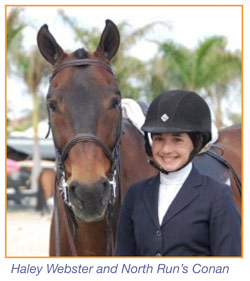 ZH: What were your impressions of WEF? What are the big differences between showing in California and Florida?
ZH: What were your impressions of WEF? What are the big differences between showing in California and Florida?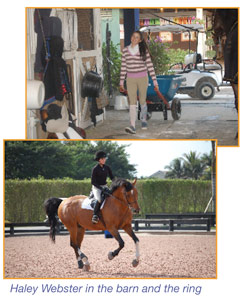 ZH: What did you show in? What were the highlights?
ZH: What did you show in? What were the highlights? 
 “The AHP’s member publications, web sites, and newsletters reach nearly 3 million people involved in the horse industry in the United States and around the world,” said Kimberly S. Brown, current AHP president. “We think this is a great opportunity for us to use our collective resources and reach into the horse industry to get answers about how we are doing today, how we think we’ll be doing in the near future, and what we are concerned about in our industry.”
“The AHP’s member publications, web sites, and newsletters reach nearly 3 million people involved in the horse industry in the United States and around the world,” said Kimberly S. Brown, current AHP president. “We think this is a great opportunity for us to use our collective resources and reach into the horse industry to get answers about how we are doing today, how we think we’ll be doing in the near future, and what we are concerned about in our industry.” A bi-coastal writer and rider, Erna’s exposure to horses started at age 7, spending her summers at Road’s End Farm in Chesterfield, New Hampshire. In her junior year in high school, Erna achieved her first byline in the Montclair Times, the large local weekly paper of Montclair, NJ, and worked as a staff writer throughout her senior year in high school. Erna studied writing and sociology at UCSB and continued to ride as a working student With Rebecca Atwater at Santa Barbara Stables and at Creek Hollow Ranch in San Diego. She joined the staff at SB Fitness Magazine and also became a regular contributor to California Riding Magazine.
A bi-coastal writer and rider, Erna’s exposure to horses started at age 7, spending her summers at Road’s End Farm in Chesterfield, New Hampshire. In her junior year in high school, Erna achieved her first byline in the Montclair Times, the large local weekly paper of Montclair, NJ, and worked as a staff writer throughout her senior year in high school. Erna studied writing and sociology at UCSB and continued to ride as a working student With Rebecca Atwater at Santa Barbara Stables and at Creek Hollow Ranch in San Diego. She joined the staff at SB Fitness Magazine and also became a regular contributor to California Riding Magazine. 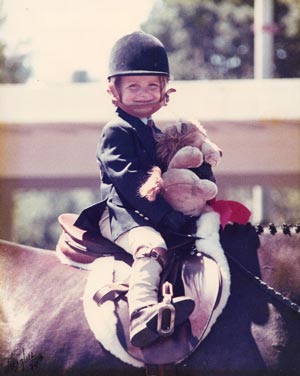 I was curious about the impact that Joe Fargis had on Kevin’s career and training methods.
I was curious about the impact that Joe Fargis had on Kevin’s career and training methods.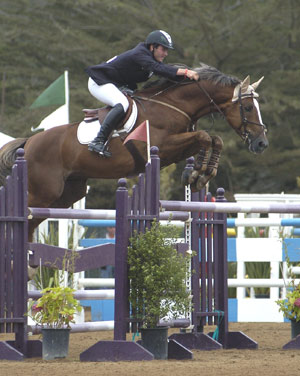 The cavalletti poles should get your horse’s hind end up underneath himself, the crossrail encourages straightness, and trotting magnifies your horse’s jump as well as the rider’s balance. After landing off of the crossrail, your horse needs to respond to your leg by going up into your hand. Having the distance already set up to the combination makes it easier.
The cavalletti poles should get your horse’s hind end up underneath himself, the crossrail encourages straightness, and trotting magnifies your horse’s jump as well as the rider’s balance. After landing off of the crossrail, your horse needs to respond to your leg by going up into your hand. Having the distance already set up to the combination makes it easier.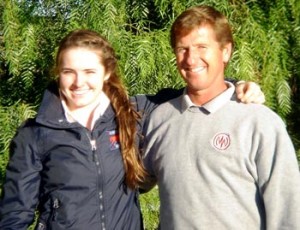 After watching her fellow Californian Aurora Griffin move to 1.50m and win Individual Bronze at Young Riders, Team Gold, Double Gold at Harrisburg, in addition to the William Steinkraus Style of Riding Award, Zazou decided it was an opportune time to ask Aurora and her trainer a few questions.
After watching her fellow Californian Aurora Griffin move to 1.50m and win Individual Bronze at Young Riders, Team Gold, Double Gold at Harrisburg, in addition to the William Steinkraus Style of Riding Award, Zazou decided it was an opportune time to ask Aurora and her trainer a few questions.